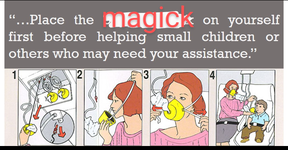I see where you’re coming from, and I’d push back a little on the “always ask consent” rule.
Some options are:
- Indirect or symbolic healing – Rather than trying to “force” energy into someone’s system, you can perform a rite for the situation itself, for their comfort, for the forces that aid healing, or for the balance of life and health in general. The energy flows toward the need without overriding the individual’s own will.
- Invocation to universal forces – Work with deities, spirits, or archetypes associated with healing. For instance, in a Norse frame, you might call on Eir (goddess of healing) or Baldr (symbol of life and restoration) to lend their force to the situation. Again, this is indirect—an appeal to powers rather than trying to channel energy straight into a person without permission.
- Intention setting – You’re right, intentions are crucial. Clearly define what you’re aiming for: relief, comfort, stabilization, guidance for medical professionals, etc. Then let the ritual reflect that intention without attempting to “rewrite” the person’s own path.
Think about it: Christians, and the various forms of Christendom, often “pray for” someone without their knowledge or permission. They don’t pause to ask if the person wants intervention—they simply act, trusting that their deity will direct the energy appropriately. So why should magicians hesitate when working with healing gods or archetypes on behalf of someone who may not know how to ask, or even that they need help? From a Chaos/Norse perspective, the gods themselves are forces—they are capable of guiding the energy safely, and of protecting the person’s will. When we call on Eir, Baldr, or other healing forces, we are not overriding anyone—we are enlisting allies who
already understand how to work with the currents of life and health.
That said, acting on someone’s behalf is not neutral. By working with or without their consent, you
tie your wyrd to that person, directly affecting your own hamingja- the luck, vitality, and life force that flows through you. You are engaging in a living relationship with their energy, which can be beneficial, but also requires mindfulness, respect, and clarity of intention. This is why intention is critical: it protects both you and the person you are helping.
Practical approach for indirect healing:
- Set clear intentions: Specify what you want to support—relief, stabilization, comfort, or guidance for caregivers.
- Call on appropriate forces: Invoke healing deities, archetypes, or universal forces symbolically through meditation, visualization, or ritual objects.
- Work with the situation, not the person: Focus energy on the illness, the environment, or the flow of life and health rather than forcing change directly.
- Release and trust: Let the energy go, trusting the forces you’ve called can act safely without your micromanagement.
- Document and reflect: Keep track of intentions, methods, and outcomes. Reflection refines practice and maintains ethical clarity.
Ultimately, the question isn’t "
can we act without permission?" -it’s
"can we act responsibly, consciously, and with clarity, knowing we are binding our own wyrd to the situation?" The answer, in my experience, is yes-but only with mindfulness and respect for the forces you are engaging.
At the end of the day, sometimes the most powerful magic is simply
focused, ethical intention-sending energy toward life and balance, without trying to rewrite someone else’s path.

